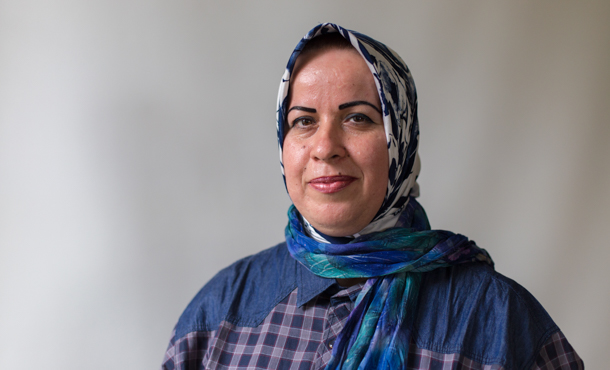At a time when walls are being reinforced and deepened around the Gaza Strip—called by some “the world’s largest open-air prison”—Maha Mehanna is doing her best to build bridges of peace across them.
Mehanna, who recently completed four weeks at Eastern Mennonite University’s Summer Peacebuilding Institute (SPI) on one of this year’s Winston Fellowships, has spent most of her life in the small region wedged between Israel and Egypt along the Mediterranean coast. She has experienced severe electricity shortages, improper sewage treatment, polluted water supplies, a lack of good food and health care, and other limited resources.
Gazans measure age by conflict rather than years, she says, terming a child “three wars old.” Destruction from three major conflicts between Israel and Gaza over the past decade and ongoing smaller skirmishes have left many homes in rubble and people living in tents. The Egyptian border is also tense, with homes being destroyed for a buffer zone.
“We adapt, but it is no life,” said Mehanna, a Palestinian Muslim, during an interview on the EMU campus earlier this month. “If you want to believe, go to Gaza and see.”
A voice to end the violence
She has carried that message around the world while also working for a better future for her people, giving voice to an often voiceless region. Mehanna has been interviewed by the Washington Post and other foreign media, spoken at international conferences alongside former U.S. Secretary of State James Baker and Israeli and Palestinian politicians, and participated in a variety of workshops and seminars in the U.S., Europe and Middle East.
At one time she asked for her face not to be shown in interviews out of fear for her safety, but more recently she has been speaking with increasing boldness.
“I eventually thought, ‘Why am I hiding myself?’ ” she says. “I am working for peace and for my country. Now I will speak to anyone. I don’t talk about who to blame for the violence. I talk about how to end it. That’s our main mission. I don’t believe there is a military solution to the conflict. How many people must be killed to show that?”
Mehanna works as a senior Arabic-English translator and office coordinator for non-governmental organization Applied Information Management (AIM), but she is intensely involved in peacebuilding efforts. She is a peace activist with the grass-roots volunteer network Other Voice, seeking solutions to the Arab-Israeli conflict; she is a member of the MEPEACE network and of Friendship Across Borders, a joint peace initiative between Germans, Israelis and Palestinians; and she aids the work of the General Assembly of Dalia Association, a Palestinian community foundation.
“I’m passionate about the field of peacebuilding,” she says. “I’m eager to continue. I want to learn more. ”
Traveling to the various events and conferences often poses a challenge, though. Such a trip requires preparing paperwork, obtaining permits from the Israeli authorities and from the local Hamas government, getting security clearance to travel to Jordan, making travel arrangements, and leaving via the Israeli Erez border crossing—if she gets approval. For one recent trip, she lost her entire flight booking because clearance didn’t come in time.
She’s more fortunate than most, though. Mehanna has been making the crossing for years to help a nephew with a rare immune disorder receive treatment in an Israeli hospital. His parents were unable to get a permit to go with him, but with Mehanna’s international connections she was able to get approval. On those trips, she witnessed signs of hope as doctors provided good care to all their patients, mothers comforted each other and children shared toys—all regardless of ethnicity or religion.
“I didn’t think of them like the enemy, and they didn’t think of me like the enemy,” Mehanna says.
She recalls a time when Israelis would come to Gaza to visit, enjoying the markets or the beach, when the borders were open.
“Everything was fine,” she says. “Now this conflict is never-ending. We need to make a change. We need to heal. All generations are traumatized. If you get the chance to leave Gaza, that’s the dream of anyone now. ”
‘Nowhere to hide’
Mehanna found some personal healing during the past month at SPI in Virginia, where she took courses on topics including organizational leadership for social transformation, training design and facilitation, foundations of restorative justice and practices for building resilience, alongside people from around the globe. She hopes to return to EMU to complete a master’s degree in conflict transformation.
“I like the community here, the diversity. I have made many good friendships in a short time,” Mehanna says. “I feel like it’s home, like family. Here, I feel free. For the first time, I have a sense of what freedom feels like. ”
Now back in Gaza, Mehanna will volunteer with Mennonite Central Committee’s Jerusalem office and do more workshops in Gaza drawing on her recent training. She hopes she can help the arduous process toward peace to move forward, but she knows many challenges—and dangers—remain.
“Nowhere is safe in Gaza, and there’s nowhere to hide,” she says. “When people ask, ‘Are you coming for SPI next year?’ I say, ‘Yes, if I’m alive.’ ”
